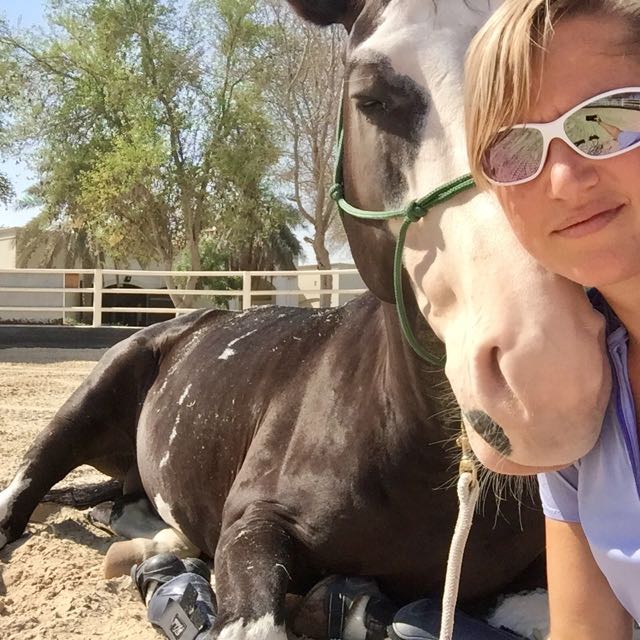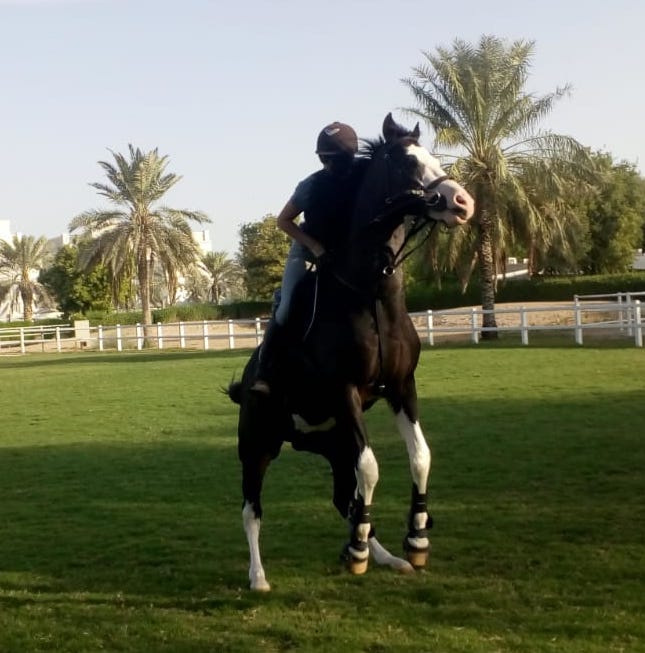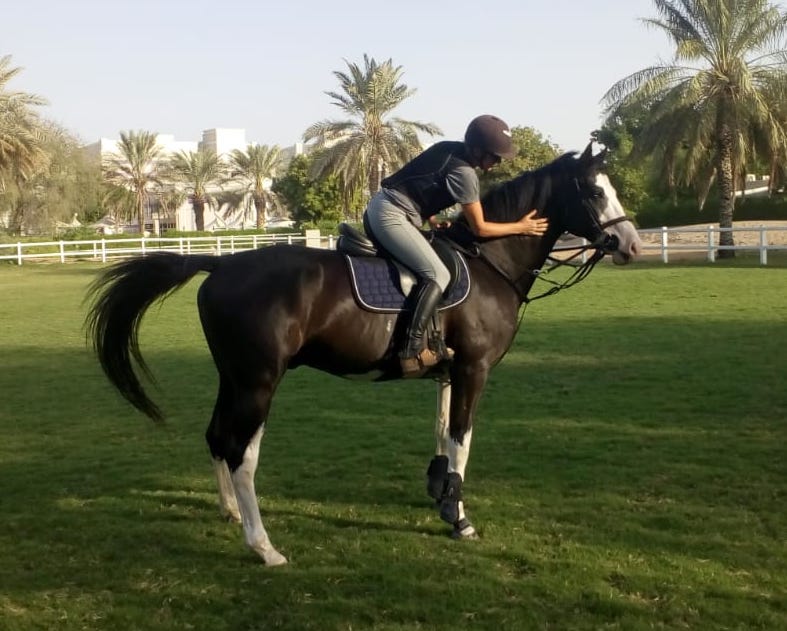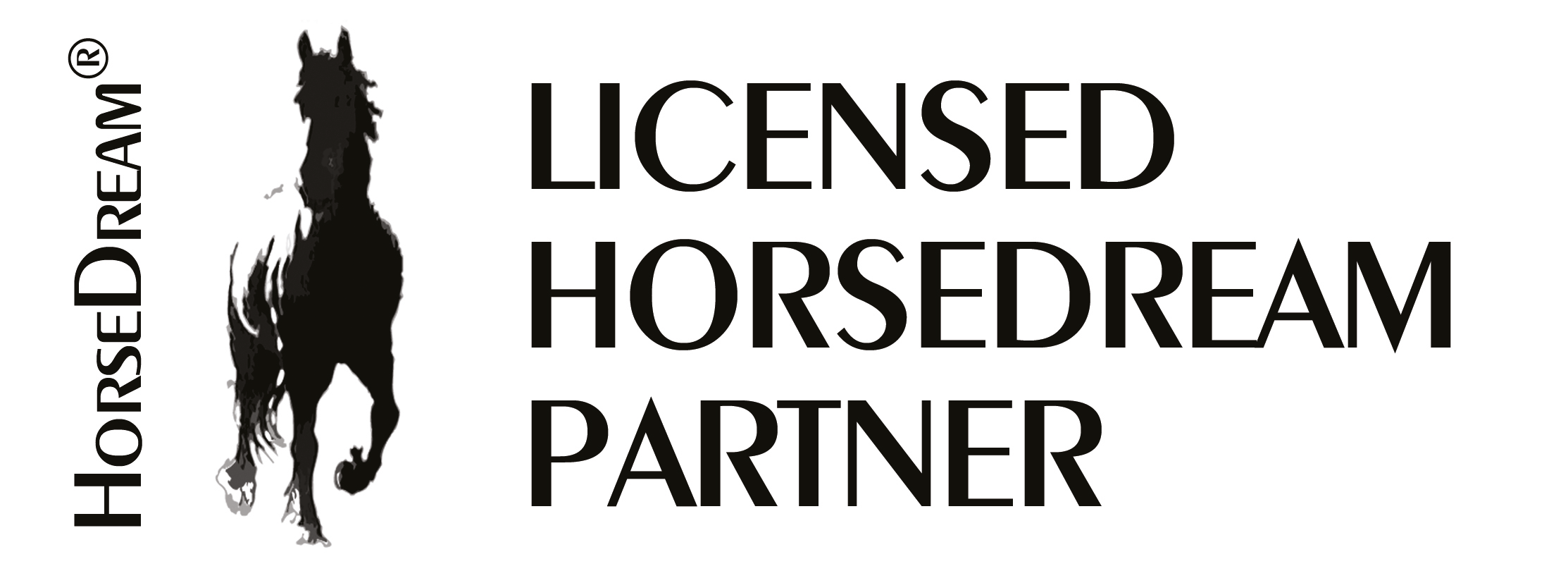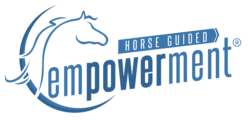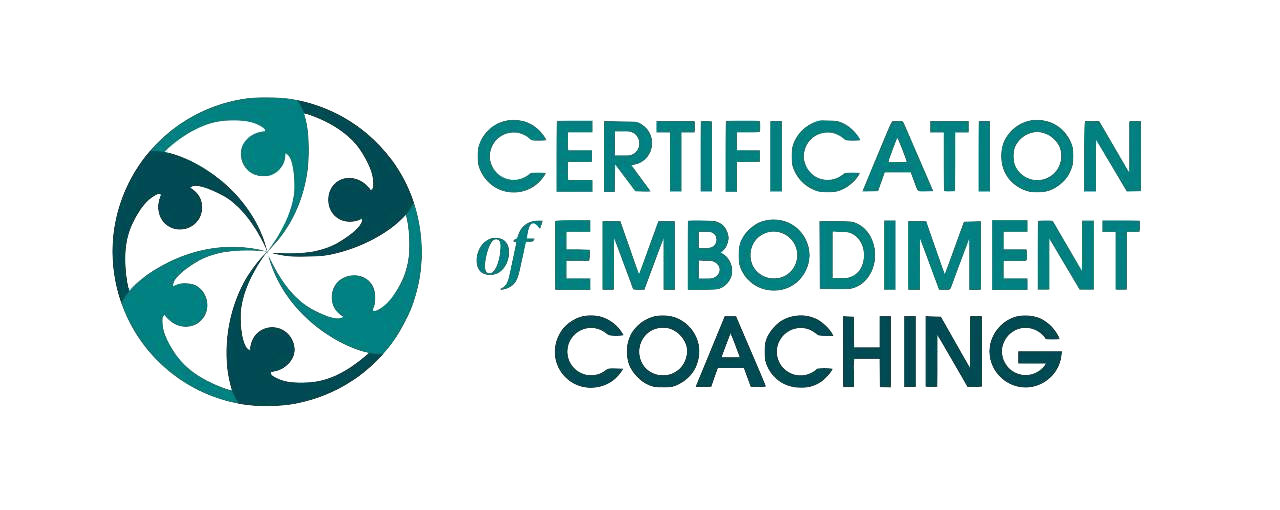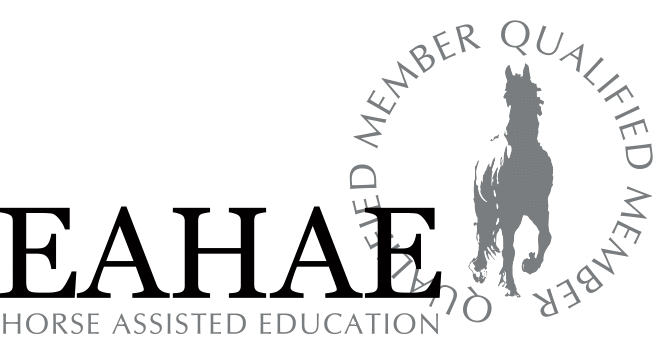Be true to yourself
Why it is important to be true to yourself...
Two days ago at the seminar of a fellow facilitator I was asked to pick a card representing emotions.
Everyone randomly picked very different cards and they seemed to fit surprisingly well to the current situation of the person who had taken it from the pack.
The card that showed up for me read:
Honoring envy
"What has been betrayed?
What must be set right?"
I was initially puzzled. Who had I been envious of?
I took a picture of the card so I could go back to read it, because in that moment I was not quite clear what these words were supposed to tell me. I had joined the day in order to meet this fellow practitioner and to see if I could learn something new from her related to my own teaching. Was I envious of her?
Today, two days later, it dawns on me that the envy was related to a different area: To my riding skills.
The stallion
For the last couple of months I was entrusted to look after and ride a beautiful, strong, very self-confident stallion. A horse who had already scared away quite a few riders with his dominant behavior, and as a consequence had not been ridden in a while.
I started off very slowly, not even considering to sit on him, just taking him out of the stable, letting him run and stretch his legs. I had been asked to help and this is what I came to do.
He surprised me already the very first day by laying down in the sun and letting me sit next to him for quite a while - a very unusual behavior for a stallion, as this puts him in a very vulnerable position.
After some weeks of only working with me on the ground, getting to know him, defending my stand point and showing him that I understood the language he was talking, I felt confident enough to start riding him. This would give us the possibility to not just work in the same area every day, but go out and trot and canter for longer periods of time.
It actually took me quite a while to convince the owner to let me sit on his horse!
He knew that his horse was not easy and did not want me to get hurt.
First time riding
When the day came, and I went into the riding arena, it was surprising to see the horse change completely!
Had he trusted me from the ground, now he felt that I was just like everyone else, trying to ride him and fight with him from the saddle.
Still, it took only a few days of me ignoring the negative behavior (rearing, stopping, turning round and biting in the stirrup) and praising him for when he just moved normal, that he may have realized he doesn't need to worry.
To me, it felt that he was just acting, showing off what he was capable of, but I did not really feel threatened by him. If he seriously wanted me down, he would have done things very differently!
I requested the owner to have him checked to make sure that there was no underlying pain causing this reaction to a rider on his back, and when it was clear that this was not the case, I continued my way.
Not fighting with him, but trying to de-escalate when he started to act up, and then just continuously trying to relax him and make him feel comfortable with a rider on his back. My only ambition in these days was to make him feel good and for me to enjoy the ride - when he was moving, it felt like floating on clouds!
Ambitions taking over
But I think somewhere down the line, with time passing, something in me must have changed.
I started looking at the other riders, jumping high over obstacles and fences, making it look super easy.
I had been winning show jumping competitions when I was a kid and teenager - there used to be a time where this was my world too.
But when my own horse got arthritis at a young age from all the jumping, and we had reached a level where it was not always about fun, but I had to push him hard at times to go over the fences that started to be higher and higher, I took a very conscious decision that there must be other ways to work with your horse, wearing them out less.
That is how I then discovered and embarked a path of classical riding, where the focus is on riding in a way that is natural, keeps your horse healthy and fit, and makes him proud of his achievements and his own body movements.
This stallion was however supposed to be a big show jumper, and so in order to continue riding him, I felt I had to show that I was capable of jumping with him. After all, a few small obstacles in the beginning surely would not harm?
They did not in the beginning, yet we came to a point where he started acting up again.
The rearing, which he had not done in 2 months, started again, and these were of course all signs that he was not comfortable with the work (or that I wasn't relaxed enough as I didn't feel comfortable).
Instead of listening to the obvious, I thought however that with practice and consequence he would get used to it and calm down.
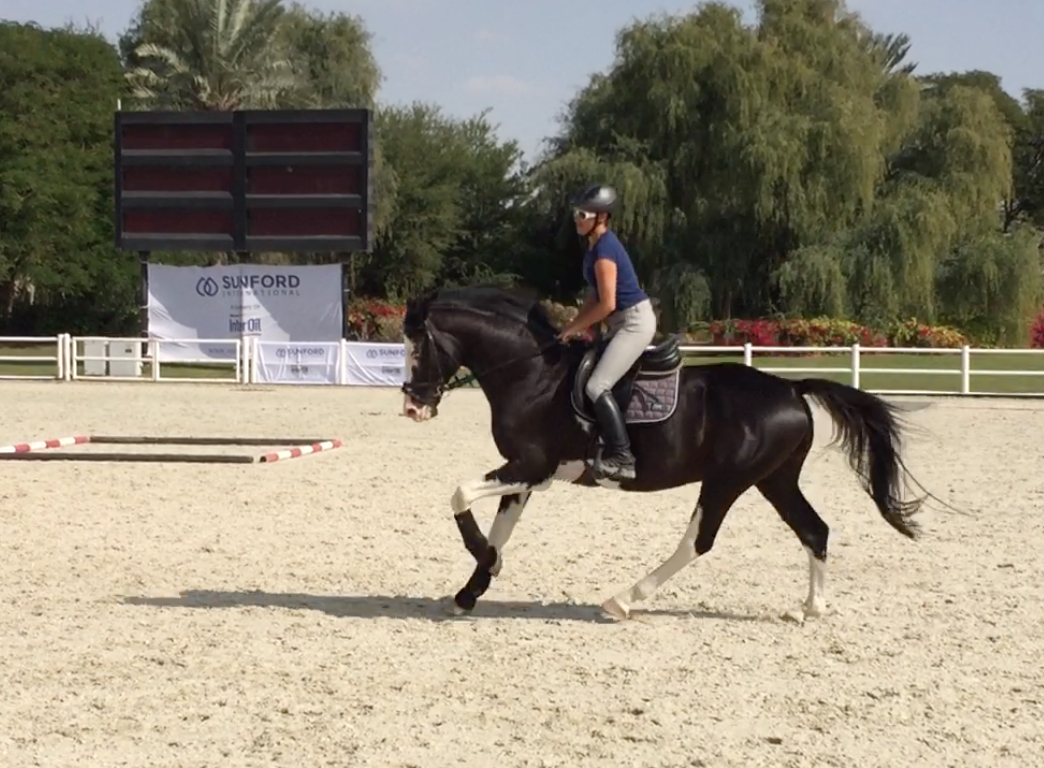
Until one day, trying to go towards a pole, on top of the rearing he also started moving sideways and I kind of lost my balance. Thinking that I don't want to fall off uncontrolled, I made the decision to jump down and was then holding the reins from the ground while he continued rearing high, which I am aware did look very scary to the people watching. After some minutes of everyone calming down I went back up on him and finished with a very nice trot and canter.
Nevertheless, I kept thinking about the incident the whole afternoon, plus it didn't help that people were telling me that I had put myself in a very dangerous situation, and that I could get badly hurt next time.
The next day the stallion of course felt my insecurity and started testing me right away, going up higher and higher, until in the end I had to admit to myself that I was scared.
I spent a long time sitting on him while he was standing patiently, and I had to start crying.
It felt that if I now went down, admitting to having been "defeated", I might never go back up again on him.
Of course there was no point to continue riding in that stage of weakness, because every time I tried to make him move, I got nervous and he got tense, ready to take over control and rear again.
And so eventually I had to ride him back to the stable after which I took him on the rope and lunged him.
Conclusions
Even though it was a horrible feeling that day, and it felt like everything was over, it has made me think a lot.
It made me think about what I want to achieve with him, about what kind of rider I want to be, and why he had started fighting me again.
I have come to the conclusion that I had indeed left my path.
The problem were not the small jumps.
The problem was my inner ambition to become someone I had never wanted to become, and he had sensed that.
The initial questions:
"What has been betrayed?
What must be set right?"
suddenly had become very clear!
Be true to yourself
I haven't sat back on him since, I only went to the stable to take him out and work with him on the ground.
However, since I have acknowledged the truth to myself - that I don't want to be a show jumper, that I don't care about competing with horses, and that I truly only care about their wellbeing and about feeling good in the partnership with them - he has been super easy to handle for me.
This is what had to be set right!
I will yet have to see if I get the courage to go back on him - but in any case, I will be forever thankful for the lesson he has taught me:
Be true to yourself.
Addendum:
I did not go back to riding him. Another lady started riding him instead, and I continued working with him in the round pen every other day, but not getting back on.
About two weeks after I last sat on him, he attacked me on the ground.
He had sustained an injury in the walker machine, and that day I wanted him to trot a few steps so I could check if he was still lame, in order to tell the other rider if she could ride him the next day.
He did not want to trot though.
We had been to the spa just before, it was lunchtime and he wanted to relax, maybe the leg was hurting, and he did not want to be pushed around, which he told me by facing me, rearing a few times, and even grunting.
Well, we had had those discussions many times before.
I did not want to appear weak, I wanted to show the stallion who is boss... and he then got to a point where he just had enough, and the only way of making me stop was to push me to the ground.
It is not a great feeling when a 600kg horse suddenly charges at you, and you know you can't get away fast enough.
To protect myself, my arm went up in front of me and got badly smashed (I now have a 15cm titanium plate and 10 screws in my right forearm), the stallion went over me and ran to the other side of the round pen.
It was a quick and very simple interaction.
He had said "no" many times before, to me, to others.
He did not like the pressure that was being put on him, and he tried every possible way to make that clear, without actually ever hurting somebody.
That day, it was just enough, his message was not being heard, even though he was literally screaming (it's a shame that horses have no sound for pain, they suffer in silence, and we ignore them).
Horses are not killers, but they are strong, and of course can injure a person badly if they defend themselves.
Lying in hospital was a wake up call and really made me think of the roots of the cause, and got me to the same point I had been many years prior to that, but which I had forgotten about.
What are we doing to these animals?
We lock them up in tiny cages, without any social interaction, without friends, without choices.
Then we show up at the barn once a day if they are lucky, and expect them to "behave" when we take them out?
When we are generous, we let them move 20 min inside a carousel or give them 20 minutes of "paddock time", again alone?
Which sentient being wants to live like that?
And how can we call ourselves animal lovers, when we accept such incarceration, and even participate in it?
I think the worst part for me, looking back, is that by going to this stable day after day over years, I got "used" to the traditional way of how riders nowadays think. I thought I am helping, but what did I really make to change these horse's lives?
In today's world, money rules.
The owners with the money get to decide over the fate of the animals, which we bring into our human world for our pleasure, and completely disrespect their needs and feelings.
We need to reach a different understanding of how we treat the animals around us, and each other.
Newsletter subscription
Sign up to my newsletter to stay up to date with upcoming courses, new information added to the website, and more news related to horse guided education in the UAE.
